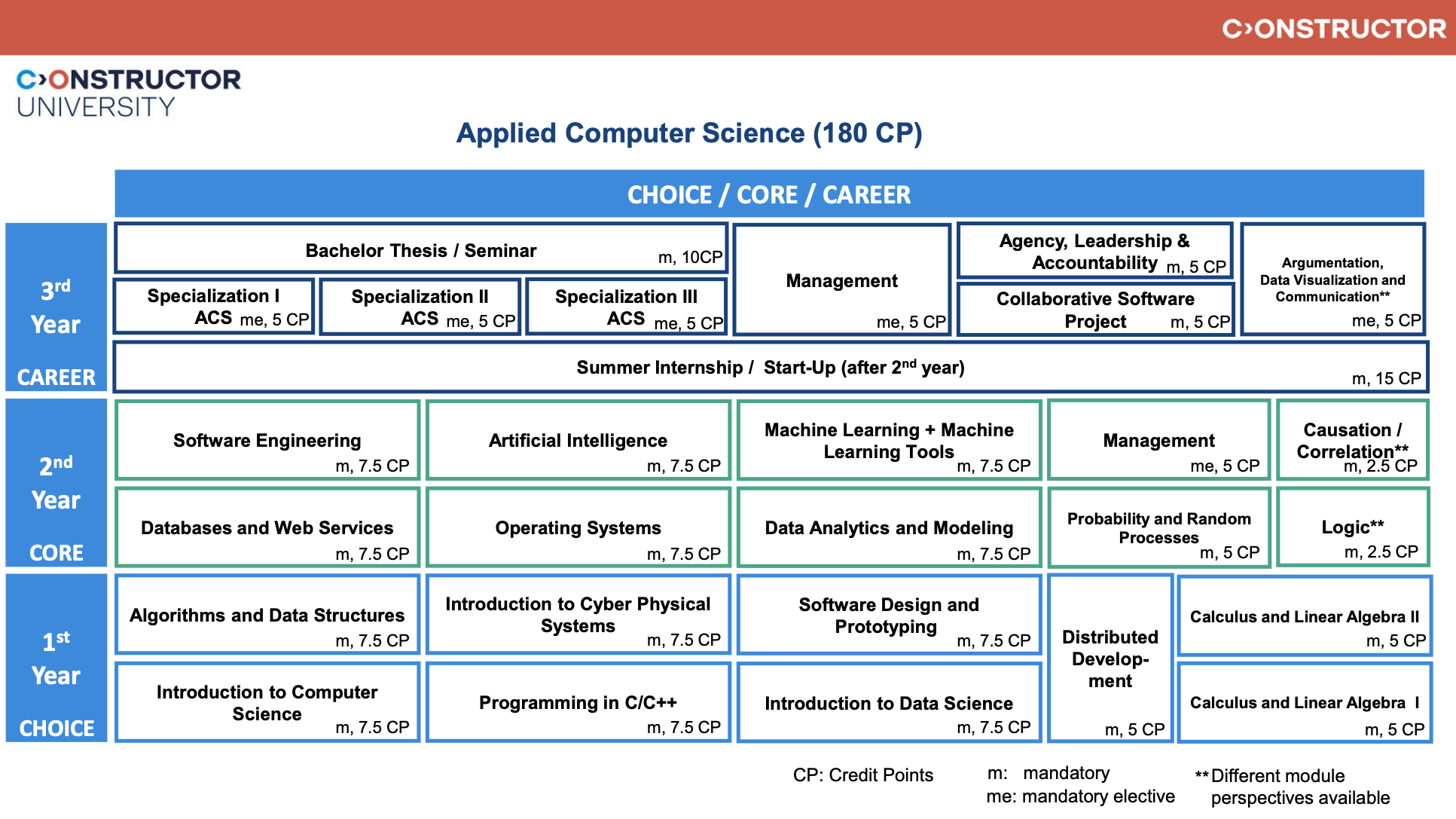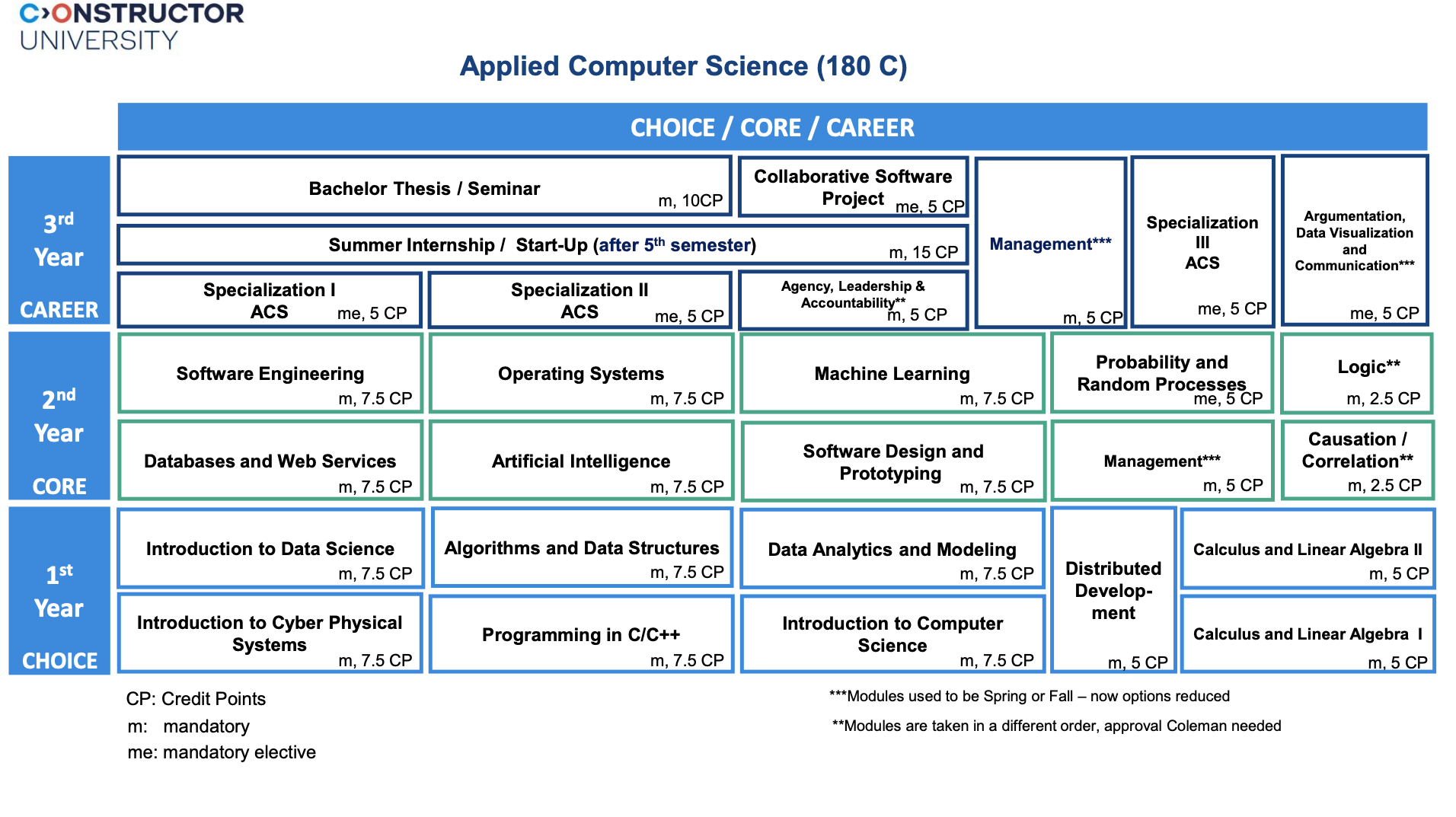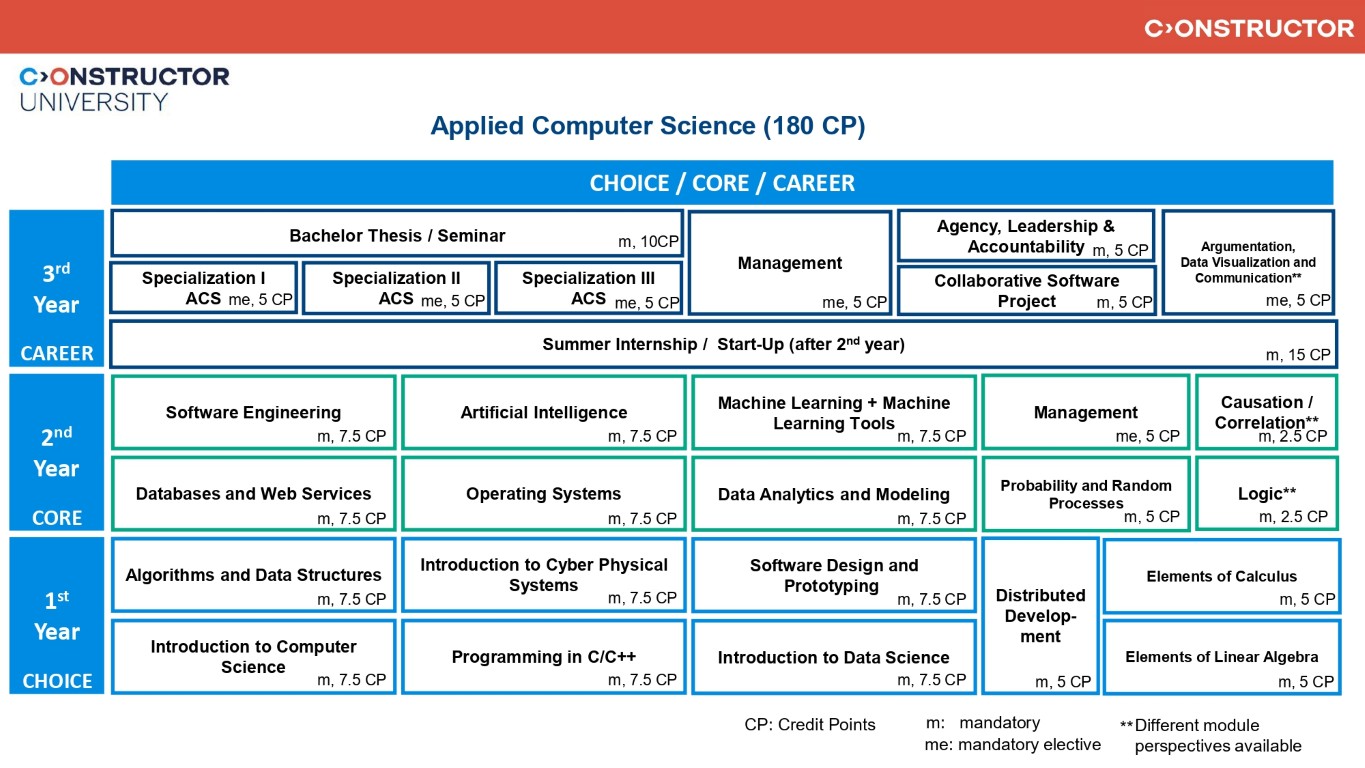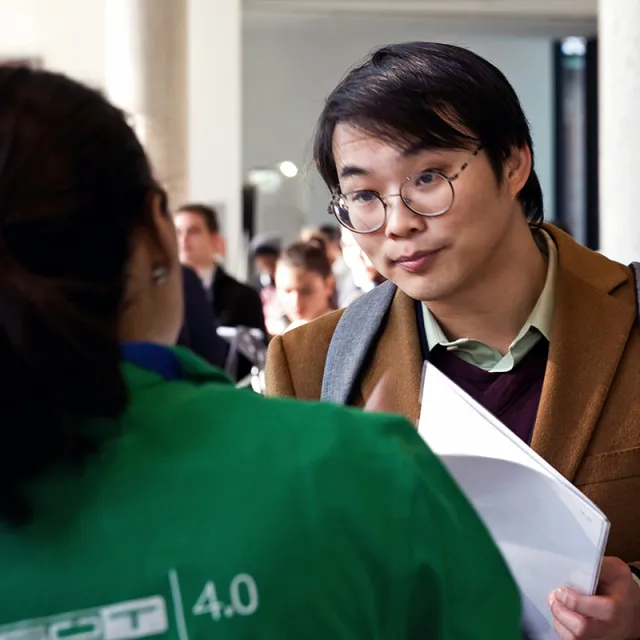

Applied Computer Science
Applied Computer Scienceand receive a regular Bachelor degree from a top-ranked private German university.
Become part of the next generation of computer scientists and software engineers! Constructor University offers this entirely online undergraduate program, making its vast experience in teaching computer science and its quality education accessible to learners across the globe.
Develop skills in software engineering and programming as well as in relevant areas of modern computer science including artificial intelligence, data analysis, and machine learning with an applied focus that will allow you to enter the job market after graduating.

Digitalization is a key driver of innovation and success across all industries. Applied Computer Science is obviously a key element in these processes. At the same time, there is a substantial change in the way daily work is organized and carried out. The share of home office and remote work increases, e.g., to collaborate with team members who are distributed around the world or to control, monitor, and maintain facilities and processes from a distance. While offering a lot of opportunities in terms of convenience for employees and reduced costs for employers, this new normal of working also requires different skills and knowledge of the related tools and methods, which are addressed by this program.
Furthermore, online education is changing the higher education landscape in profound ways. It caters for specific needs and interests of students, especially in terms of the flexibility in which they can carry out their studies. And it is a natural option to prepare them for the new normal of remote work.
Students of Applied Computer Science participate in online courses with pre-dominantly asynchronous lectures and exercise material, which are complemented by tutorials and hands-on sessions. Students are guided and supported by faculty as well as experienced tutors and lecturers to transfer the acquired knowledge into practice. The hands-on elements include high amounts of collaboration with other students, use of tools and concepts to engage in distributed work from different places in potentially different time-zones, and remote access to physical devices and set-ups.
The Computer Science core of the program is complemented with Management and Leadership modules in the second and third study years. Students will not only be trained in programming and software development, but will also acquire fundamental knowledge in business and learn how innovations can be transferred into a marketable product. Furthermore, they may take part in interdisciplinary courses in which problems are tackled from a wider perspective challenging them to think outside the boundaries of their discipline.
Overall, by completing their studies, students will be able to directly enter the job market or to continue their studies in a graduate program, for example, the MSc in Computer Science and Software Engineering offered at Constructor University. Apart from the solid knowledge and skills obtained in Applied Computer Science, graduates are particularly well prepared for the demands of modern work, i.e. to work remotely and as part of a diverse team.
The first study year is characterized by a university-specific offering of disciplinary education that builds on and expands upon the students’ entrance qualifications. Students take introductory modules for a total of 60 CP from the Year 1 area. The Academic Advising Coordinator offers curriculum counseling to all Bachelor students independently of their major, while Academic Advisors, in their capacity as contact persons from the faculty, support students individually in deciding on their major study program.
Applied Computer Science students take the following mandatory modules in the first semester (30 CP)
- CHOICE Module: Introduction to Computer Science (7.5 CP)
- CHOICE Module: Programming in C/C++ (7.5 CP)
- CHOICE Module: Introduction to Data Science (7.5 CP)
- CHOICE Module: Distributed Development (2.5 CP)
- Methods Module: Matrix Algebra and Advanced Calculus I (5 CP)
and the following modules in the second semester (30 CP):
- CHOICE Module: Algorithms and Data Structures (7.5 CP)
- CHOICE Module: Introduction to Cyber Physical Systems (7.5 CP)
- CHOICE Module: Software Design and Prototyping (7.5 CP)
- CHOICE Module: Distributed Development (2.5 CP)
- Methods Module: Matrix Algebra and Advanced Calculus II (5 CP)
The modules Programming in C and C++ and Algorithms and Data Structures introduce students to imperative and object-oriented programming and basic algorithms and data structures. The Introduction to Computer Science module discusses abstract and concrete notions of computing machines and algorithms, and the representation of information. Students are also exposed to a pure functional programming language. The Software Design and Prototyping module deals with prototyping software, also known as mockup systems. It is complemented by the Distributed Development module that deals with practical aspects of remotely developing software in teams distributed at different physical locations. The module Introduction to Cyber Physical Systems deals with the relations and interfaces of software to computer hardware, embedded systems, sensors and actuators, and networking. Relevant mathematical content is covered in the Matrix Algebra and Advanced Calculus modules and in the Introduction to Data Science module.
In their second year, students take a total of 50 CP from a selection of in-depth, discipline-specific modules. Building on the introductory Year 1 modules and applying the methods and skills students have already acquired so far, these modules aim to expand the students’ critical understanding of the key theories, principles, and methods in their major for the current state of knowledge and best practice.
In Year 2, Applied Computer Science students acquire the following disciplinary and methods mandatory modules (50 CP in total):
- CORE Module: Databases and Web Services (7.5 CP)
- CORE Module: Operating Systems (7.5 CP)
- CORE Module: Data Analytics and Modeling (7.5 CP)
- CORE Module: Software Engineering (7.5 CP)
- CORE Module: Artificial Intelligence (7.5 CP)
- CORE Module: Machine Learning (7.5 CP)
- Methods Module: Probability and Random Processes (5 CP)
In the second year, core areas of Computer Science with a high relevance to modern software development are covered in the modules Databases and Web Services, Operating Systems, Artificial Intelligence, and Machine Learning. Knowledge in Software Engineering is deepened in the according module. Relevant mathematical aspects are covered in the modules Probability and Random Processes and Data Analytics, where the latter – together with Artificial Intelligence and Machine Learning – also deepens the knowledge related to Data Science. Multiple modules include practical software development aspects, namely Software Engineering, Databases and Web Services, Artificial Intelligence, Machine Learning, Machine Learning Tools and Data Analytics and Modeling.
Additionally, the students will take two mandatory “new skills” modules from the university-wide CONSTRUCTOR Track which is dedicated to multidisciplinary content dedicated to methods as well as intellectual skills (5 CP in total) (please also see 2.2.3.5):
- New Skills Module: Logic (2.5 CP)
- New Skills Module: Causation and Correlation (2.5 CP)
The remaining 5 CP must be chosen from the Management Elective area, which includes Management oriented modules that provide basic business and management knowledge.
- Digital Business Models and Functions (5 CP)
- Marketing and Methods (5 CP)
An updated list of all modules in this Elective area will be available in the online course catalogue at the start of the second academic year.
During their third year, students prepare for and make decisions about their career after graduation. To explore available choices fitting individual interests, and to gain professional experience, students take a mandatory summer internship (see 2.2.3.1). The third year of studies allows Applied Computer Science students to take ACS Specialization modules, two new skills modules and two further Management Elective modules (as described in Chapter 2.2.3.3). Finally, the 6th semester is dedicated to fostering the students’ research experience by involving them in a Bachelor thesis project.
As a core element of Constructor University’s employability approach students are required to engage in a mandatory two-month internship of 15 CP that will usually be completed during the summer between the second and third years of study. This gives students the opportunity to gain first-hand practical experience in a professional environment, apply their knowledge and understanding in a professional context, reflect on the relevance of their major to employment and society, reflect on their own personal role in employment and society, and develop a professional orientation. The internship can also establish valuable contacts for the students’ bachelor’s thesis project, for the selection of a master program graduate school or further employment after graduation. This module is complemented by career advising and several career skills workshops throughout all six semesters that prepare students for the transition from student life to professional life. As an alternative to the full-time internship, students interested in setting up their own company can apply for a start-up option to focus on developing their business plans.
For further information, please contact the Student Career Support.
In the third year of their studies, students take 15 CP of advanced ACS Specialization modules to consolidate their knowledge and to be exposed to state-of-the-art research in the areas of their interest. This curricular component is offered as a portfolio of modules, from among which students can select freely during their fifth and sixth semester. The default module size is 5 CP, with smaller 2.5 CP modules being possible as justified exceptions.
Applied Computer Science students take at least 15 CP from the following abridged list of ACS Specialization Modules:
- ACS Specialization Module: Computer Graphics (5 CP)
- ACS Specialization Module: Computer Networks (5 CP)
- ACS Specialization Module: Web Application Development (5 CP)
- ACS Specialization Module: Human Computer Interaction (5 CP)
An updated list of all modules in the ACS Specialization area will be available in the online course catalogue at the start of the third academic year.
Students take 10 CP from the Management area to acquire valuable knowledge in the field of business and management. Modules in this area aim to bridge the gap from software development to marketable software products and to prepare students interested in a management-oriented career track. A broad spectrum of topics is tackled, such as product development, innovation, marketing, leadership, general business, and change management. The following management module is mandatory for all students:
- Management module: Collaboration Software Project (5 CP)
In the collaborative software project, the students deepen their knowledge and skills in one or multiple areas of the first and especially second year. They are exposed to state-of-the-art research with the goal to derive ideas and strategies to address application-oriented problems and to develop software for them. Students learn how to organize and execute an application-oriented research and development (R&D) project. Students are expected to organize themselves in group work under the guidance of the instructor.
Further 5 CP must be chosen from Management elective modules. An updated list of all modules in the Management area will be available in the online course catalogue at the start of the third academic year.
This part of the curriculum constitutes the intellectual and conceptual tool kit, and is designed to cultivate and nurture the capacity for a particular set of intellectual dispositions – curiosity, imagination, critical thought, transferability – as well as a range of individual and societal capacities – self-reflection, argumentation and communication – and to introduce students to the normative aspects of inquiry and research – including the norms governing sourcing, sharing, withholding materials and research results as well as others governing the responsibilities of expertise as well as the professional point of view.
All students are required to take the following modules in their second year as mentioned in 2.2.2:
- New Skills Module: Logic (2.5 CP)
- New Skills Module: Causation and Correlation (2.5 CP)
In the third year, students take two 5 CP modules that build upon previous modules in the track and are partially constituted by modules that are more closely linked to each student’s disciplinary field of study. The following modules are mandatory for all students in the third year:
- New Skills Module: Argumentation, Data Visualization and Communication (5 CP)
- New Skills Module: Agency, Leadership and Accountability (5 CP)
This module is a mandatory graduation requirement for all undergraduate students. The title of the thesis will appear on the students’ transcripts.
Within this module, students apply the knowledge skills, and methods they have acquired in their major discipline to become acquainted with actual research topics, ranging from the identification of suitable (short-term) research projects, preparatory literature searches, the realization of discipline-specific research, and the documentation, discussion, and interpretation of the results.
With their Bachelor Thesis students demonstrate mastery of the contents and methods of their major-specific research field. Furthermore, students show the ability to analyze and solve a well-defined problem with scientific approaches, a critical reflection of the status quo in scientific literature, and the original development of their own ideas. With the permission of a Constructor Faculty Supervisor, the Bachelor Thesis can also have an interdisciplinary nature.



All study programs at Constructor University are accredited by the German Accreditation Council, guaranteeing adherence to high academic quality and international standards. This accreditation confirms that each program meets formal and subject-related criteria in terms of content, structure, and intended learning outcomes.
Yes. The online Master's and Bachelor's programs are regular university programs. The only difference is the teaching mode.
This degree gives you access to the German Job Market. After graduation, you can apply for a 6-month job search visa, once you find a job, you can be granted a residence permit. You do have similar access in terms to access to the market as German citizens (for as long as you are paid a fair wage, you are entitled to work permit).
Constructor University awards Bachelor degrees which have for almost 20 years been recognized across the world by graduate schools and employers. However, since international students are not studying in person in Germany/Europe and do not have the same visa/residence permit status, extra efforts need to be undertaken to get access to the German/European job market, e.g., by looking for internship placements in these regions. Constructor University can provide support with potential internship offerings. Online students can also use the advantage of studying and engage in work or internships in their own home countries.
The online Master's and Bachelor's programs are regular university programs. The diploma is awarded in the same manner and it does not state the mode of teaching. Upon graduation, the student is awarded three different documents: Diploma, Diploma Supplement, and Transcript. The Diploma and Transcript do not mention the mode of teaching, the Diploma Supplement does.
Because the program is taught online and does not require on-campus presence, the issuing of visa to reside in Germany in the course of their studies cannot be guaranteed. However, if there are no visa limitations, you are free to reside also in Bremen to complete your online studies. Residence would then be off-campus. Upon request, Constructor University can support you in finding off-campus accommodation.
You will be invited to join the Graduation Ceremony but you need to arrange and pay for your travel. If you participate in the Graduation Ceremony and fulfill the graduation requirements by the deadline set by Student Registrar Services, you will receive the diploma awarded at the graduation ceremony. The diploma and diploma supplement are always issued later and sent to you.
And if you cannot participate in the graduation ceremony, the documents will be sent to you in physical form by mail.
You will be invited to join the Graduation Ceremony but you need to arrange and pay for your travel. If you participate in the Graduation Ceremony and fulfill the graduation requirements by the deadline set by Student Registrar Services, you will receive the diploma awarded at the graduation ceremony. The diploma and diploma supplement are always issued later and sent to you.
And if you cannot participate in the graduation ceremony, the documents will be sent to you in physical form by mail.
There is no financing option for this program (scholarships, tuition deferral program and need-based aid are not applicable to this online program).
Digitalization is affecting all areas of business, industry, daily life, and society. There is accordingly a very high demand for graduates with a background in Applied Computer Science in general. In addition, students have been trained to be able to work in a remote, collaborative fashion and being able to engage in life-long learning, i.e., to acquire or update knowledge and skills in the fast-moving areas of Computer Science in an independent and self-governed way. This offers not only increased flexibility for graduates to engage in professional opportunities worldwide, it is also a substantial benefit for potential employers as they may select from an increased pool of talented candidates, whom they do not need to relocate to work on their job.
Students learning
The areas of employment are almost unlimited as digitalization is important in business, industry, daily life, and society. Within these areas, research & development or management tracks can be taken. The job market includes jobs such as software engineer, information systems manager, data analyst, computer systems engineer, application developer, IT consultant, remote maintenance manager, and system analyst.

Digitalization is a key driver of innovation and success across all industries. Computer Science and Software Engineering are critical elements in these processes. Shape the future and kickstart your career by acquiring the technical knowledge and marketable skills employers seek. Constructor University’s online program excellently prepares students to work remotely in heterogeneous teams and empowers them for future work.
Students are guided through their studies via the state-of-the-art Learning Management System (LMS) provided by Constructor, leveraging an active approach to knowledge discovery.
Tutors and lecturers support our students in their learning through virtual study groups, peer evaluation, and mentoring. This is an online program with optional blended elements such as internships at our partner institutions to gain professional experience.

Call us or write us – we are happy to help you with your inquiry.
Muhammed Hageg
Recruitment Counselor Online Program
Email: onlineprogram@constructor.university
Phone: +491622013305

